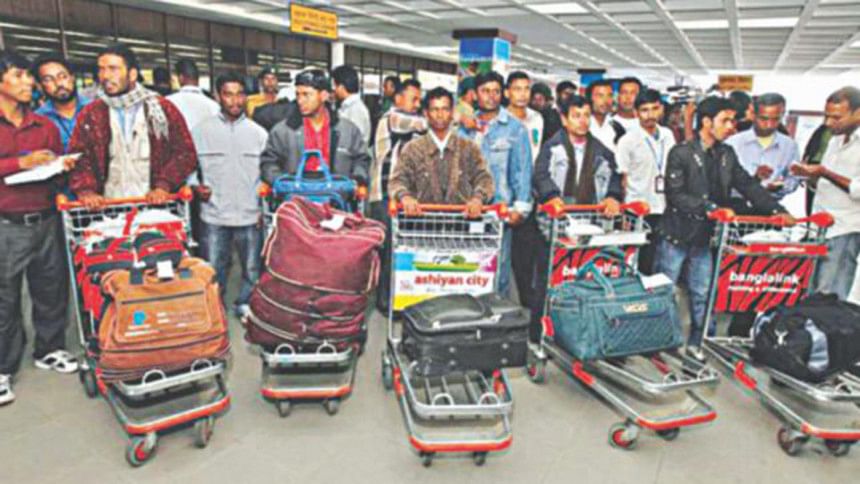Migrant workers in graft mire

Around 90 percent of five lakh Bangladeshi male workers had to pay two to three times the usual migration cost last year to obtain work visas for seven countries, including five in the Middle East.
They also paid bribes at different stages at the Expatriates' Welfare and Overseas Employment Ministry and the Bureau of Manpower, Employment and Training (BMET) for visa approval to go to the destination countries, according to a Transparency International Bangladesh (TIB) report released yesterday.
The workers had to pay between Tk 5 lakh and 12 lakh each for getting a Saudi visa and at least Tk 3 lakh each for visas for Oman, Qatar, Singapore, Malaysia, the UAE and Bahrain. But the private recruiting agents spent only Tk 1 lakh to Tk 2.5 lakh on each visa, it mentioned.
At least Tk 5,234 crore was laundered from Bangladesh last year for getting visas for these countries, said the report titled "Good Governance in Labour Migration Process: Problem and Way Out".
Of the amount, Tk 1,242 crore was sent to Qatar through hundi, Tk 1,229 crore to Singapore, Tk 1,105 crore to Oman, Tk 817 crore to Saudi Arabia, Tk 454 crore to Bahrain, Tk 361 crore to Malaysia, and Tk 27 crore to the UAE.
The TIB report is based on information from government and private institutions and on different media reports from May last year to January this year.
Manzoor E Khoda, TIB programme manager (research and policy), gave details of the irregularities and corruption at various stages in processing the visas.
“The workers had to pay from Tk 5 lakh to Tk 12 lakh each for a Saudi visa whereas the government-fixed rate is only Tk 1.65 lakh,” he pointed out.
On average, the workers paid Tk 6 lakh to Tk 8 lakh each for obtaining a Singapore visa, Tk 3.5 lakh to Tk 6.5 lakh each for a Malaysia visa, and Tk 3 lakh to 5 lakh each for Oman and Qatar visas.
Recruiting agents make a net profit of at least Tk 30,000 to Tk 50,000 per visa, said Manzoor, who along with TIB researcher Shahzada M Akram, presented the findings at a press briefing at the TIB head office in the capital.
TIB Executive Director Dr Iftekharuzzaman said the sending of workers abroad is almost entirely controlled by brokers.
"Employers and recruiting agents of the destination countries strike deals with Bangladeshi recruiting agents for visa trade."
Responding to a query, he said the amount of laundered money may go up in future if this “visa trade” cannot be stopped.
He hoped the government would take into consideration the recommendations in the TIB report and take action accordingly.
GRAFT AT VARIOUS STAGES
Applicants had to pay a bribe of Tk 13,000 to 15,000 each for approval of a work visa at the expatriates' welfare ministry that approved 61,122 visas last year.
They also paid Tk 5,000 to Tk 15,000 each for BMET approval for a Malaysia visa, and Tk 100 to 200 for each visa for other countries. Besides, they had to spend Tk 500 to 1,000 each for police clearance.
The recruiting agents also take extra money from migrant workers in the name of health test and immigration clearance from the BMET, the report said.
“Brokers exploit migrant workers, taking advantage of their ignorance ... As these brokers remain out of accountability or legal action, they easily deceive prospective jobseekers and take extra money from them.”
A section of officials at the labour wings of some Bangladeshi missions abroad are also a party to these corrupt practices, it mentioned.
Contacted, Expatriates' Welfare Minister Nurul Islam said he was unaware of the TIB findings. “The TIB didn't contact me,” he told The Daily Star.
But Iftekharuzzaman said they sat with the ministry and discussed the findings on February 12.
Talking to this correspondent, Bangladesh Association of International Recruiting Agencies President Benjir Ahmed said recruiting agents at home and abroad are involved in “visa trade”, and this is a major reason behind the high migration cost.
In its report, the TIB observed that the migration sector lacks good governance due to legal, institutional and procedural limitations. The whole labour migration process is complicated, and it takes long to complete. The applicants have to go through 24 to 27 stages for getting visas, immigration clearance and smart cards.
The corruption watchdog recommended that the government amend some clauses of the Overseas Employment and Migrant Welfare Act 2013, bring brokers under a legal framework to hold them accountable, fix compensation for workers five times the migration cost and set up one-stop service centres.

 For all latest news, follow The Daily Star's Google News channel.
For all latest news, follow The Daily Star's Google News channel. 



Comments